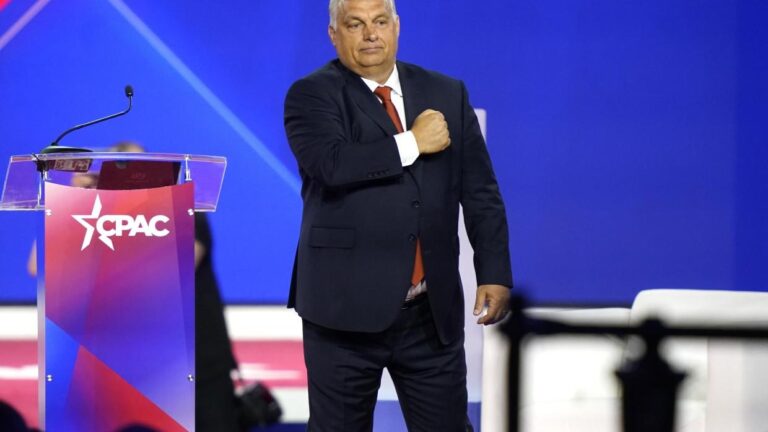Strengthening Transatlantic Conservative Alliance: A New Chapter in 2024 Election Strategies
Hungarian Prime Minister Viktor Orbán recently delivered a powerful message in Dallas, urging American conservatives to consolidate their efforts ahead of the crucial 2024 elections. Highlighting core principles such as national sovereignty, the importance of family-centered policies, and cultural heritage preservation, Orbán emphasized the growing ideological convergence between his administration and US conservative factions. This appeal signals a strategic move toward enhanced collaboration, reflecting a broader trend of transatlantic conservative solidarity that could significantly influence political dynamics on both continents.
Orbán’s address identified several key policy areas where Hungarian and American conservative priorities align, including:
- Upholding traditional family values and marriage definitions
- Implementing stringent immigration policies
- Advocating for economic nationalism and protectionism
- Opposing globalist frameworks and supranational governance
This visit marks a diplomatic effort to exchange political strategies and strengthen campaign efforts, with analysts predicting potential joint initiatives that emphasize sovereignty and cultural identity as central themes in conservative discourse worldwide.
Orbán’s Call for Unity Among US Conservatives: A Strategic Appeal
During his Dallas speech, Orbán passionately urged US conservative groups to forge a united front in the face of the 2024 elections. He warned that disunity could lead to significant setbacks against progressive opponents. His message centered on rallying around shared ideals such as national sovereignty, economic liberty, and the preservation of traditional family structures. This call has sparked widespread discussion within American conservative circles about the necessity of cohesive strategies and alliances.
Highlights from Orbán’s address include:
- Encouraging bipartisan cooperation to boost voter engagement
- Defending national identity against perceived external threats
- Focusing on policy-driven unity rather than partisan divisions
| Core Conservative Principle | Orbán’s Emphasis |
|---|---|
| National Sovereignty | Key to resisting globalist influences |
| Economic Freedom | Supporting entrepreneurship and deregulation |
| Family Values | Safeguarding traditional social frameworks |
Political experts in the US are evaluating the prospects of a consolidated conservative coalition that transcends party boundaries. While some see this as a chance to revitalize electoral prospects, others caution about the challenges of uniting diverse ideological groups. Nonetheless, the urgency of Orbán’s message is clear: fragmentation within the conservative base could jeopardize success in the upcoming election cycle.
Strategies for US Right-Wing Groups to Expand Their Reach in 2024
To enhance their influence in the 2024 elections, US conservative organizations should focus on cultivating inclusive coalitions that extend beyond their traditional supporters. Drawing inspiration from international conservative leaders, outreach efforts should engage faith communities, entrepreneurs, and moderate conservatives motivated by themes of economic stability and social cohesion. Crafting messages that blend national sovereignty with practical policy solutions can unite these varied constituencies, creating a formidable alliance that overcomes internal divisions.
From an operational standpoint, leveraging advanced digital tools for grassroots mobilization and fundraising is critical. Recommended tactics include:
- Targeted social media campaigns designed to engage younger conservative voters
- Virtual forums and webinars featuring prominent conservative voices and policymakers
- Data analytics-driven voter outreach to identify and activate swing voters
| Focus Area | Recommended Action | Anticipated Outcome |
|---|---|---|
| Coalition Building | Forge partnerships with grassroots and local influencers | Expanded voter engagement |
| Digital Outreach | Deploy influencer marketing and targeted advertisements | Increased online interaction and support |
| Fundraising | Implement online donation campaigns and crowdfunding | Enhanced financial resources for campaigns |
Orbán’s Visit and the Future of Transatlantic Conservative Cooperation
Viktor Orbán’s recent engagement in Dallas represents a significant step toward deepening collaboration between European and American conservative movements as the 2024 elections near. He underscored the urgency of forming a united conservative front to counteract liberal policies that, in his view, threaten cultural heritage and democratic norms on both continents. Orbán’s vision centers on shared priorities such as:
- Protecting national sovereignty from supranational interference
- Advocating for traditional family values as foundational societal elements
- Enhancing security collaboration to address global geopolitical challenges
This emerging transatlantic alliance is poised to reshape political strategies, with conservative leaders aiming to develop unified platforms capable of influencing electoral outcomes in both the US and Europe. Analysts note that Orbán’s direct outreach to American conservatives exemplifies a growing trend of cross-border ideological partnerships that are increasingly shaping policy and election tactics.
| Strategic Focus | Common Conservative Objective |
|---|---|
| National Sovereignty | Limit external influence on domestic governance |
| Family & Cultural Values | Support legislation that reinforces family and cultural traditions |
| Security Cooperation | Strengthen intelligence sharing and defense partnerships |
Conclusion: Transatlantic Conservative Momentum Heading into 2024
As the 2024 election cycle draws near, Viktor Orbán’s Dallas visit highlights the intensifying collaboration between European and American conservatives aiming to influence political outcomes on both sides of the Atlantic. The response from US conservative groups to this call for unity may well signal a broader evolution in international right-wing cooperation, potentially reshaping the global political landscape in the months to come.







